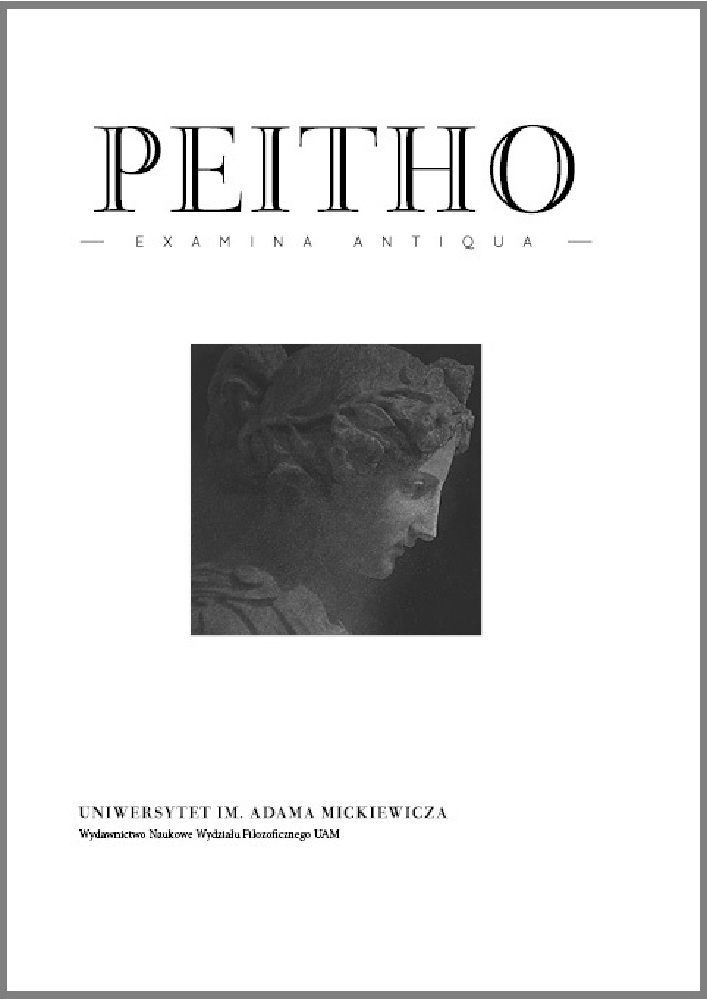Abstract
The aim of the present article is to analyse the Apology in its aspect of time. When defending himself against the charges, Socrates appeals to the past, the present and the future. Furthermore, the philosopher stresses the meaning of the duration of time. Thus, the seems to suggest that all really important activities demand a long time to benefit, since they are almost invariably connected with greater efforts. While the dialogue proves thereby to be an ethical one, the various time expressions also gain an ethical dimension.References
Anderson, D.E., 1967, “Socrates’ Concept of Piety”, JHPh 5, pp. 1–13.
Barfield, R., 2011, The Ancient Quarrel between Philosophy and Poetry, Cambridge.
Brickhouse, T.C. & Smith N.D., 1989, Socrates on Trial, Princeton.
Burnyeat, M.F., 1997, “Impiety of Socrates”, AncPhil 17, pp. 1–12.
Callahan, J.F., 1948, Plato. Time, the Moving Image of Eternity, in: J.F. Callahan, Four Views of Time in Ancient Philosophy, Cambridge, pp. 3–37.
Coulter, J.A., 1964, “The Relation of the Apology of Socrates to Gorgias’ Defence of Palamedes and Plato’s Critique of Gorgianic Rhetoric”, HSPh 68, pp. 269–303.
Crotty, K., 2009, The Philosopher’s Song. The Poets’ Influence on Plato, Lanham–Boulder–New York–Toronto–Plymouth UK.
Diogenes Laertius, The Lives and Opinions of Eminent Philosophers, transl. C.D. Yonge, London, 1853.
Feaver, D.D., Hare, J.E., 1981, “The Apology as an Inverted Parody of Rhetoric”, Arethusa 14, pp. 205–216.
Ferguson, A.S., 1913, The Impiety of Socrates, CQ 7, pp. 157–175.
Gajda, J., 1993, Platońska droga do idei. Aksjologiczny rodowód platońskiej ontologii, Wrocław.
Giannantoni, G., 1990, Socratis et Socraticorum reliquiae, vol. II, Napoli.
Guthrie, W.K.C., 1969, A History of Greek Philosophy, vol. III: The Fifth–Century Enlightenment, Cambridge.
Guthrie, W.K.C., 2000, Sokrates, tłum. K. Łapiński, S. Żuławski, Warszawa [A Polish translation of Idem, Socrates, Cambridge 1971].
Harrison, A.R.W., 1971, The Law of Athens. Procedure, Oxford.
Isocrates, 1945, vol. III, transl. L. van Hook, Cambridge MA and London.
Kerferd, G.B., 1981, Sophistic Movement, Oxford.
Lewis, T.J., 1990, “Parody and Argument from Probability in the Apology”, Ph&Lit 14, pp. 359–366.
Lloyd, G.E.R., 1987, Czas w myśli greckiej, transl. B. Chwedeńczuk, in: Czas w kulturze, A. Zajączkowski (red.), Warszawa 1987, pp. 207–258 [A Polish translation of Idem, Views on Time in Greek Thought, in: L. Gardet et al. (eds.), Cultures and Time, Paris, 1976, pp. 117–148].
Lycurgus, 1962, in: Minor Attic Orators, vol. II, transl. J.A. Burtt, M.A., London and Cambridge MA.
Lysias, 2000, transl. S.C. Todd, Austin.
MacDowell, D.M., 1995, Aristophanes and Athens. An Introduction to the Plays, Oxford.
Mansfeld, J., 1980, “The Chronology of Anaxagoras’ Athenian Period and the Date of His Trial”, Mnemosyne 33, pp. 17–95.
Moore, J. M., 1975, Aristotle and Xenophon on Democracy and Oligarchy, Berkeley and Los Angeles.
Nerczuk, Z., 2005, „Retoryczność Platońskiej Obrony Sokratesa”, Studia Antyczne i Mediewistyczne 3 [38], pp. 43–48.
Plato, Euthyphro, Apology, Crito, Phaedo, Phaedrus, transl. H.N. Fowler, Cambridge MA and London, 1996.
Platon, 2003, Obrona Sokratesa, R. Legutko (transl. & comm.), Kraków.
Reader, H., 1905, Platons philosophische Entwickelung, Leipzig.
Reale, G., 1993, Historia filozofii starożytnej, t. 1: Od początków do Sokratesa, transl. E.I. Zieliński, Lublin [A Polish translation of Idem, Storia della filosofia antica, vol. I: Dalle origine a Socrate, Milano 1979].
Reeve, C.D.C., 1989, Socrates in Apology. An Essay on Plato’s Apology of Socrates, Indianapolis.
Roochnik, D.L., 1985, “Apology 40c 4–41e 7: Is Death Really a Gain?”, CJ 80, pp. 212–220.
Shero, L.R., 1927, “Plato’s Apology and Xenophon’s Apology”, CW* 20, pp. 107–111.
Shero, L.R., 1941, “Apology 26 d–e and the Writings of Anaxagoras”, CW* 35, pp. 219–220.
Vander Waerdt,P.A., 1994, “Socrates in the Clouds”, in: P.A. Vander Waerdt (ed.), The Sophistic Movement, Ithaca and London.
Vlastos, G., 1999, “Socratic Piety” [w:] G. Fine (ed.), Plato 2: Ethics, Politics, Religion and the Soul, Oxford, pp. 56–77.
License
Peitho provides immediate open access to its content on the principle that making research freely available to the public supports a greater global exchange of knowledge.
